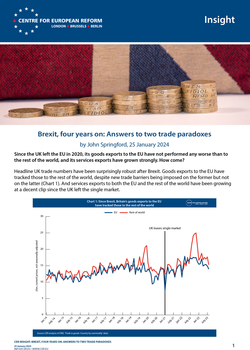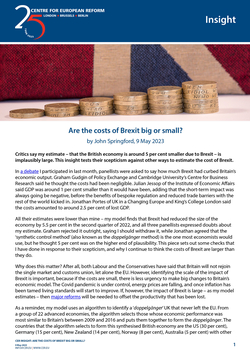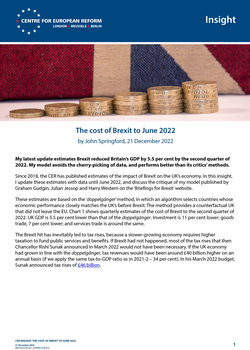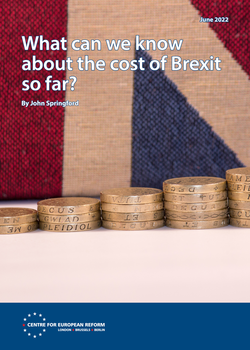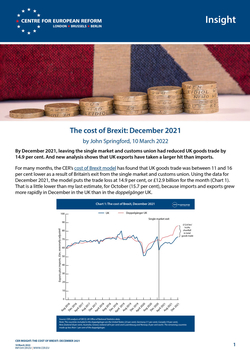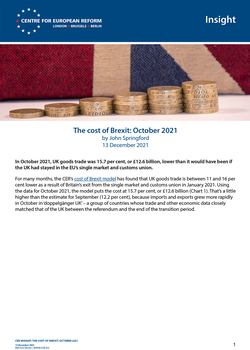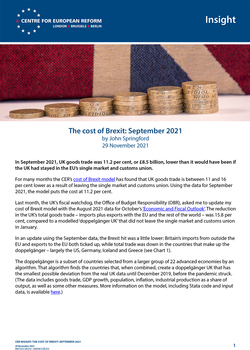Cost of Brexit
Brexit, four years on: Answers to two trade paradoxes
25 January 2024
Since the UK left the EU in 2020, its goods exports to the EU have not performed any worse than to the rest of the world, and its services exports have grown strongly. How come?
Are the costs of Brexit big or small?
09 May 2023
Critics say my estimate – that the British economy is around 5 per cent smaller due to Brexit – is implausibly large. This insight tests their scepticism against other ways to estimate the cost of Brexit.
The cost of Brexit to June 2022
My latest update estimates Brexit reduced Britain's GDP by 5.5 per cent by the second quarter of 2022. My model avoids the cherry-picking of data, and performs better than its critics’ methods.
What can we know about the cost of Brexit so far?
09 June 2022
The UK's GDP is 5.2 per cent smaller than a modelled ‘doppelgänger’ UK that did not leave the EU; investment is 13.7 per cent lower, and goods trade, 13.6 per cent lower. Most of those costs are down to Brexit.
The cost of Brexit: December 2021
10 March 2022
By December 2021, leaving the single market and customs union had reduced UK goods trade by 14.9 per cent. And new analysis shows that UK exports have taken a larger hit than imports.
The cost of Brexit: October 2021
13 December 2021
In October 2021, UK goods trade was 15.7 per cent, or £12.6 billion, lower than it would have been if the UK had stayed in the EU’s single market and customs union.
The cost of Brexit: September 2021
29 November 2021
In September 2021, UK goods trade was 11.2 per cent, or £8.5 billion, lower than it would have been if the UK had stayed in the EU’s single market and customs union.
The cost of Brexit: May 2021
21 July 2021
The Centre for European Reform estimates that leaving the single market and customs union has reduced UK trade in goods by £10 billion or 13.5 per cent in May 2021.
The cost of Brexit: April 2021
14 June 2021
We estimate that leaving the single market and customs union had reduced UK trade by 11 per cent in April 2021. That is on top of our previous finding of a 10 per cent hit to trade between the referendum and leaving the single market.
The cost of Brexit: March 2021
12 May 2021
We estimate that leaving the single market and customs union had reduced UK trade by 11 per cent in March 2021. That is on top of a 10 per cent hit to trade between the referendum and leaving the single market.
The cost of Brexit: February 2021
13 April 2021
We estimate that leaving the single market and customs union had reduced UK trade by 5 per cent by February 2021. That is on top of a 10 per cent hit to trade between the referendum and leaving the single market.
The cost of Brexit, January 2021: The end of transition edition
12 March 2021
The first of a new CER series provides estimates for the effect of Brexit on UK trade – both before and after the end of the transition period.
The cost of Brexit to June 2019
16 October 2019
The UK economy is 2.9 per cent smaller than it would be if the UK had voted to remain in the European Union, according to our latest estimate of the cost of Brexit to the end of the second quarter of 2019.
The cost of Brexit to December 2018: Towards relative decline?
30 March 2019
The UK economy is 2.5 per cent smaller than it would be if Britain had voted to remain in the European Union. The knock-on hit to the public finances is £19 billion – or £145 million a week.
The cost of Brexit to September 2018
27 January 2019
The UK economy is 2.3 per cent smaller than it would be if Britain had voted to remain in the European Union.
The cost of Brexit to June 2018
30 September 2018
The British economy is 2.5 per cent smaller than it would be if Remain had won in 2016, according to the latest update of the CER's cost of Brexit model.
What's the cost of Brexit so far?
23 June 2018
New analysis by the CER – which we will update quarterly – estimates that the UK economy is 2.1 per cent smaller as a result of the vote to leave the EU.





